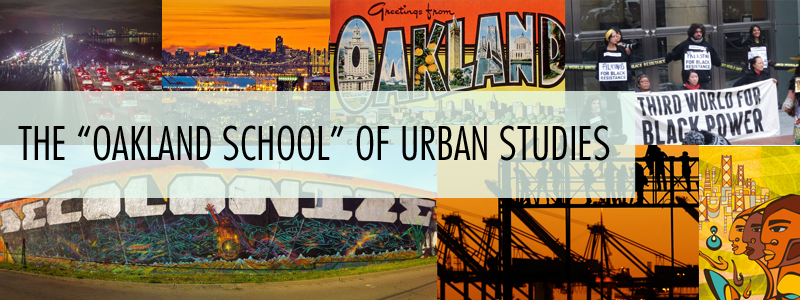Association of American Geographers (AAG) 2016
Call for Papers: “The ‘Other’ Side of the Bay: Contested Geographies of Oakland”
Association of American Geographers Annual Meeting
San Francisco, CA | March 29th – April 2nd, 2016
This session is sponsored by The “Oakland School” of Urban Studies, a graduate-student working group supported by the University of California Humanities Research Institute (UCHRI).
Oakland, CA has long appeared at the margins of authoritative maps of U.S. and world cities. It has been seen as what geographer Jennifer Robinson (2002, 2006) calls an “ordinary city,” too “insignificant” to be considered a site of general knowledge about “the urban.” This is not to say that the city has been simply “off the map.” To the contrary, it has been incorporated into the representational geography and power geometry of the urban system in very particular ways—as subaltern, subcultural, and“pathological”—that have reinforced, however paradoxically, its marginality in mainstream urban discourses.
Recently, however, this has begun to change. Since the recession in 2008, Oakland has seen an influx of new residents and businesses, an extreme spike in the cost of housing, and an upsurge of positive media coverage that have had far-reaching, if uneven, effects on the city and its residents. Once (dis)regarded in terms of a highly racialized “image problem” (Rhomberg, 2004; Douzet, 2012), it has come to occupy an increasingly privileged position in the geographical imaginary and political economy of the Bay Area. At the same time, it has seen new rounds of racialized dispossession. Since 2011, over 10,000 homes—most of them concentrated in low-income communities of color—have been foreclosed (King, 2012), intensifying patterns of displacement that have resulted in the loss of over 34,000 African-American and Black-identified residents since 2000 (Rose & Lin, 2015). These contentious dynamics have put a spotlight on the city as a paradigmatic site in ongoing struggles over questions of housing affordability, economic and environmental justice, immigrant rights, Native land rights and recognition, and racialized state violence. There is thus a sense that something significant is happening in Oakland. But what that “something” is, or how to think about it, presents an increasing challenge for academics, activists, residents, and policymakers alike.
This session emerges out of the collaboration of The “Oakland School” of Urban Studies, a graduate-student working group supported by UCHRI. Meeting throughout the 2015-16 academic year, we aim to identify and tease apart the many lines of force that converge in and emanate from this contested city. We invite academics, artists, activists, and others working to think about and act upon this city in flux to join us as we attempt to define and debate the conjunctural moment in Oakland. What are the many processes working together to (re)shape the city? How do they relate to one another? How has the city been manufactured and mapped in the past? How is its status as a site and sign being transformed today? And to what extent do the much-discussed tropes of “gentrification,” “displacement,” “diversity,” and “state violence” express, obscure, and/or performatively enact this transformation in its many determinations?
While prioritizing work that specifically engages this city as its site of inquiry, we welcome papers not geographically centered on Oakland. These could be analyses that contribute to our understanding of how Oakland—as a place, process, and icon—is constructed and circulates in broader cultural discourses, policy spheres, and spatial and political imaginaries. They could also be analyses of other places that nevertheless demonstrate how a critical reading of “Oakland” allows us to think about contemporary urbanism more broadly in new ways.
Some potential themes include:
- militarization, surveillance, policing, and incarceration
- gentrification, displacement, and dispossession
- indigenous sovereignty, settler colonialism, and decolonization
- regional economic restructuring and changing geographies of the “tech” industry
- relationship between Oakland, San Francisco, and other regional centers
- affordable housing
- environmental justice
- comparative racialization
- transnationalism and immigrant justice
- multiculturalism and consumption
- queer politics
- cultural productive and expressive cultures
- public space
- cultural politics of belonging
- urban citizenship and rights to the city
- political organizing and social movements
Please email abstracts of up to 250 words to oaklandschoolaag@gmail.com by October 15, 2015. We will send out notifications about acceptance by October 22.
For more information about the AAG annual meeting, including registration fees, dates, etc., please see: www.aag.org/cs/annualmeeting.
For more information and ongoing updates about our group, The “Oakland School” of Urban Studies, please see: www.oaklandschool.ucdavis.edu.
References
Douzet, Frédérick. (2012). The Color of Power: Racial Coalitions and Political Power in Oakland. Charlottesville: University of Virginia Press.
King, Steve. (2012). Who Owns Your Neighborhood? The Role of Investors in Post- Foreclosure Oakland. Oakland: Urban Strategies Council.
Rose, Kalima & Lin, Margaretta. (2015). A Roadmap Towards Equity: Housing Solutions for Oakland, California. Oakland: PolicyLink.
Rhomberg, Chris. (2004). No There There: Race, Class, and Political Community in Oakland. Berkeley: University of California Press.
Robinson, Jennifer. (2002). Global and world cities: A view from off the map. International Journal of Urban and Regional Research, 26(3), 531-54.
———. (2006). Ordinary Cities: Between Modernity and Development. New York: Routledge.
